I was born and raised in Switzerland. Like many international students, there were a lot things that I had to get used to when I came to America. The one difference that stumped me the most about the United States was the drinking age.
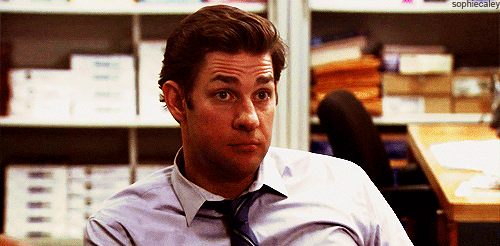
Gif courtesy of giphy.com
Legally, you are allowed to consume and purchase beer and wine at the age of 16 in Switzerland, and spirits at the age of 18. In fact, 18 years is the average legal drinking age in almost every European country with the exception of Iceland, where the limit has been set at 20. Furthermore, the Wikipedia article on “Legal Drinking Ages” shows that most European countries don’t have a required “drinking age,” only a compulsory “purchasing age.” In contrast, the United States has set both the purchasing and drinking age at 21.
Why, you ask?

Gif courtesy of giphy.com
That is a great question.
The main reason seems to lie in a centuries old English common law. English common law stated that a person matured at the age of 21 and could only then be considered an adult. Thus, this age was also deemed a great time to maturely drink alcohol (because we all become so mature as soon as we hit 21).
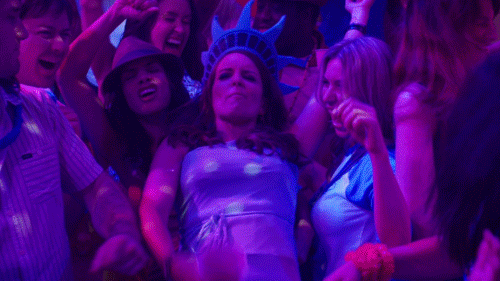
Gif courtesy of giphy.com
That law was actually circumvented for a period of about 14 years thanks to President Franklin Roosevelt, who lowered the conscription age to 18 once World War II rolled around. After the Vietnam War, people were understandably a bit peeved that their sons (forget about ladies for the time being—that’s a whole other discussion) could die for their country, but not vote. This led to the ratification of the 26th Amendment in 1971, which allowed citizens to vote at 18.
At this point states just attributed the same law to drinking, because why the hell not? The age dropped around the country (at this point, states determined individual drinking ages). 13 years later, MADD (Mothers Against Drunk Driving) and other organizations succeeded in raising awareness about the rise of drunk driving accidents and fatalities. This led to President Reagan signing the National Minimum Drinking Age Act of 1984, which set the national drinking age in the US back to 21.
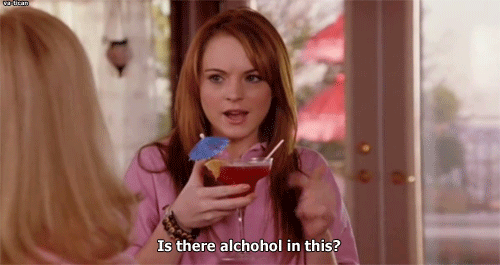
Gif courtesy of giphy.com
Despite the desires of many college students, only 25% of American polled would like to petition for the drinking age to be lowered, whereas 74% oppose this opinion.
Considering this debate, here is some food for thought and some solid facts for the inevitable in-class argument.
Brain Development
Alcohol impairs the function of the brain. This is especially true in the case of adolescents. In fact, irreparable damage could be done due to binge drinking. Binge drinking is more widely expected of adolescents because their prefrontal cortex, which is involved in working memory and impulse control, is not fully developed.
However, the brain doesn’t fully develop until the mid-twenties, so we would all be affected by the possibility of binge-drinking, as well as brain impairment—legal or not. Awkward.
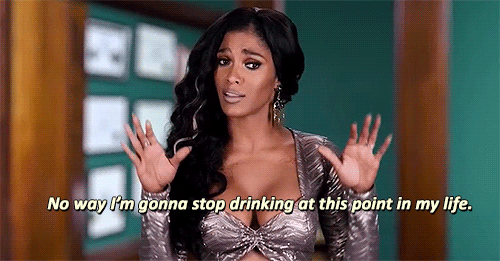
Gif courtesy of giphy.com
Driving
Here’s your consolation prize, America: Driving at 16!
We all know that alcohol slows reaction time and blurs vision. As a result, car accidents are more likely to happen while under the influence of alcohol, which can lead to death. After MADD came together to lower the drinking age, the rate of accidents steadily declined.
According to MADD statistics, most drunk driving accidents happened between the ages of 21 and 24 in 2011. Though the statistics are a little old, this shows that most drinking related accidents occur within a couple of years of becoming legal, showing that mature or not, everyone can get carried away with alcohol, especially in the first rush of “being legal.”
However, it’s important to note that other things were invented to keep us safe from car accidents (airbags, seat belts) since the formation of MADD, which might also explain the decline in numbers not solely being dependent on drinking.
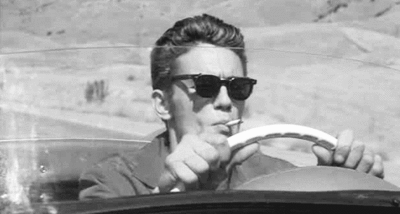
Gif courtesy of giphy.com
Responsibility and Supervision
Since their brain is not fully developed, adolescents might not make responsible decisions regarding alcohol. Drinking frequently around parents may encourage children to adopt negative habits and abuse alcohol when unsupervised.
On the flip side, one could argue that learning how to drink alcohol responsibly around your parents at a younger age (say 16) improves the chances of adolescents making better decisions regarding alcohol once they start drinking among their friends.
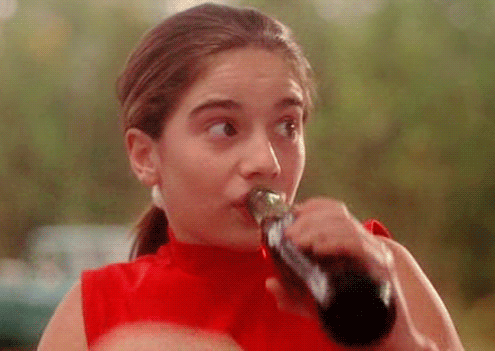
Gif courtesy of giphy.com
Despite all these different arguments, we have to remember that drunk driving is a problem and that it occurs everywhere. In fact, statistics show that France’s death rate due to drunk driving is much higher than in America. If there is any lesson to take away from this, it is that regardless of where you’re from, please drink responsibly!
So, is it wise to change the drinking age in America? I venture to say no. 21st birthdays have become a cultural rite of passage in the United States. European cities may have fostered early drinking as part of their culture, but the United States has instilled an almost religious anticipation of turning 21. Thus, a sudden change might not only result in some sort of backlash of drunk accidents due to exuberant drinking, but it would take away the joy (and party) of turning 21. If the drinking age was lowered, turning 21 would just denote making the scary step into your “real” twenties as getting old(er). Where’s the fun in that?! There would be nothing to look forward to! Plus, what’s more exciting than sneaking some vino in your dorm room?
Here’s to waiting for 21 and drinking responsibly. Cheers!

Gif courtesy of giphy.com


